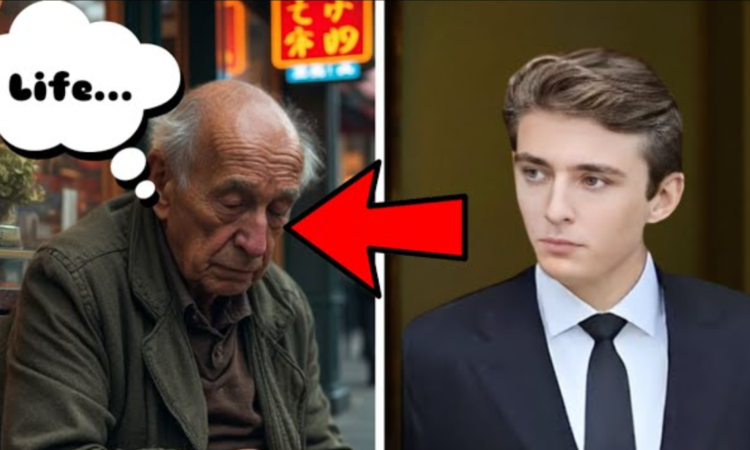Old Man Begs for Food at Restaurant but Is Thrown Out—What Barron Trump Did Next Shocked Everyone

The icy wind tore through the city streets as Gerald shivered, clutching his thin coat tighter around his frail body. His hands trembled, not from the cold alone but from hunger gnawing at his insides. Once a proud man and a retired teacher who had inspired countless young minds, Gerald was now a shadow of his former self. His family—his own blood—had abandoned him, leaving him to fend for himself in cruel loneliness and despair.
Standing outside a bustling restaurant, Gerald’s gaze lingered on the bright neon sign that seemed to mock his misery. Inside, people laughed, ate, and drank without a care in the world. Gerald hesitated before stepping toward the door, whispering to himself, “Just a piece of bread. Maybe they’ll have mercy.”
As he entered, all heads turned. The laughter stopped, replaced by hushed whispers and judgmental stares. Before he could utter a word, a burly manager stormed toward him. “Get out! We don’t want beggars scaring away our customers,” he barked. Tears stung Gerald’s eyes as he stumbled back outside. The door slammed shut, sealing him away from warmth and humanity.
That night, Gerald slept on a park bench, wondering if anyone in the world cared whether he lived or died.
The following morning, Gerald awoke to the sound of footsteps and muffled voices. The city streets were still cloaked in a gray haze as he blinked his blurry vision into focus. A group of people approached the restaurant, and among them was a tall young man flanked by security guards—Baron Trump. Gerald recognized him immediately, his face often gracing headlines.
Gerald had no intention of begging; he had endured enough humiliation. But as Baron’s group passed, one of the guards glanced at Gerald and muttered something under his breath. Baron stopped in his tracks. “Why is he sitting here?” Baron asked, his voice calm but commanding.
Gerald looked away, ashamed. “I’m no one,” he muttered.
Baron knelt, his sharp eyes softening. “No one deserves to be left like this.” He pulled out his phone, making a quick call. Before Gerald could process what was happening, a guard handed him a cup of coffee and a blanket. “Wait here,” Baron said, his words kind but tinged with mystery.
Shortly after, the guards returned with a hot meal, placing it gently in Gerald’s lap. For the first time in months, Gerald felt human again. The warmth of the food and coffee was almost too much to bear.
“You’ll need your strength,” Baron said, observing Gerald’s trembling hands. Questions swirled in Gerald’s mind. Why was Baron, someone so far removed from his world, doing this?
“You’re coming with me,” Baron finally declared. Despite his ingrained mistrust of humanity, something in Baron’s unwavering sincerity convinced Gerald to accept. As the car pulled away, Gerald realized he was leaving behind not just the restaurant, but the despair that had defined his recent life.
The car stopped in front of a modest building. Gerald had expected grand mansions, but this was a shelter Baron had personally funded—a haven for those society had forgotten. “This is where you’ll stay,” Baron said, guiding Gerald inside.
Warmth enveloped Gerald as he stepped in. Staff members greeted him with genuine smiles, and the scent of fresh bread filled the air. Maria, the shelter manager, showed him to a small but cozy room. As Gerald sat on the bed, the floodgates opened. Months of pain, humiliation, and loneliness poured out in tears.
“I don’t know how to thank you,” Gerald whispered.
“You don’t need to,” Baron replied. “Just promise me one thing—when you’re strong again, help someone else.”
As days turned into weeks, Gerald began adapting to life at the shelter. Maria encouraged him to take small steps toward healing. At first, even simple tasks like helping in the kitchen felt daunting. But one morning, seeing an elderly woman struggling to peel potatoes, Gerald offered to help.
The woman’s radiant smile warmed his heart. That small act rekindled a sense of purpose within him. Soon, Gerald found himself organizing books in the library and mentoring children who visited after school. Their laughter and curiosity breathed life into him.
Despite his progress, one question lingered—why had Baron Trump helped him? One evening, Gerald was sharing stories with the children when a commotion erupted. Baron had returned.
“How are you settling in?” Baron asked.
“I don’t know how to thank you,” Gerald stammered.
“You don’t need to,” Baron replied. But he had a proposition. Handing Gerald an envelope, Baron said, “Open it when you’re ready.”
Inside was a letter and a key. The letter read:
“Gerald, you’ve been given a second chance, but so have I. Seeing you reminded me that no one succeeds alone. I want to give you more than shelter—I want to give you a chance to rebuild. The key is to an apartment I’ve arranged for you. It’s yours, but there’s a condition: mentor others who’ve lost their way. Share your story. Show them that even when the world turns its back on you, there’s still hope.”
The words sank deep into Gerald’s heart. The apartment was modest but felt like home. Determined not to let this chance slip away, Gerald returned to the shelter to share his journey. His story inspired many, proving that even the darkest moments could lead to light.




